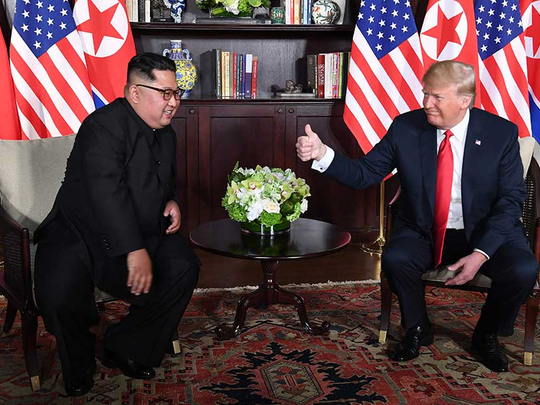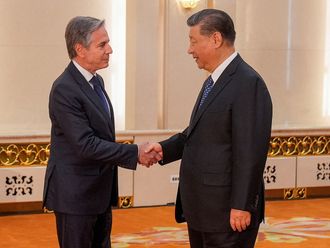
Washington, D.C.: President Donald Trump’s pledge on Tuesday to cancel military exercises on the Korean Peninsula surprised not only allies in South Korea but also the Pentagon.
Hours after Trump’s announcement in Singapore, US troops in Seoul said they are still moving ahead with a military exercise this fall — Ulchi Freedom Guardian — until they receive guidance otherwise from the chain of command.
Lt. Col. Jennifer Lovett, a US military spokeswoman in South Korea, said in an email that the US command there “has received no updated guidance on execution or cessation of training exercises — to include this fall’s schedule Ulchi Freedom Guardian.”
“We will continue with our current military posture until we receive updated guidance from the Department of Defence,” she added.
In Washington, officials at the Pentagon, State Department and White House were scrambling to figure out exactly the impact of Trump’s comments.
“The Department of Defence continues to work with the White House, the inter-agency, and our allies and partners on the way forward,” Lt. Col. Christopher Logan, a Pentagon spokesman, said in an email. “We will provide additional information as it becomes available.”
In Seoul, President Moon Jae-in of South Korea hailed Trump’s summit meeting with North Korean leader Kim Jong-un. Moon called the joint statement that was released after the meeting “a historic event that has helped break down the last remaining Cold War legacy on earth.”
But Trump’s promise to end joint military exercises with Seoul left many South Koreans stunned. The annual exercises have been an integral part of the alliance, forming the bulwark of South Korea’s defence against North Korea and Seoul’s sense of security among bigger powers in the region.
Ulchi Freedom Guardian is one of the largest military exercises in the world. The war games, which last year ran for 11 days, have involved some 17,500 US forces, including about 3,000 from outside the peninsula, and 50,000 South Korean troops. The exercises include computer simulations carried out in a large bunker south of Seoul intended to check the allies’ readiness to repel aggressions by North Korea.
Trump’s announcement raised fears in the South Korean capital that Washington was making concessions too fast, before North Korea has dismantled its nuclear weapons.
The South Korean Defence Ministry hurriedly issued a curt statement saying that it was trying to figure out Trump’s intentions.
US officials said the military exercises are important because the allies use them to ensure readiness and promote the ability to operate with similar equipment and tactics. On a strategic level, they demonstrate the strength of the decadeslong alliance with South Korea.
“On the face of it, seems like a pretty big concession,” said Brian McKeon, who was a senior Pentagon official during the Obama administration.
McKeon added that it was unclear whether Trump’s order applies only to major war games like Ulchi Freedom Guardian, or a series of other smaller, but important, training maneuvers. “It would definitely impact readiness” of both US and South Korean forces, he said.
In a Tuesday news conference in Singapore, before heading back to Washington, Trump focused on the potential cost savings of ending major exercises, which he said were “tremendously expensive” to conduct.
“We will be stopping the war games, which will save us a tremendous amount of money,” the president said, also criticising South Korea for not defraying more of the costs. “We have to talk to them. We have to talk to many countries about treating us fairly.”
Republican Senator Lindsey Graham, who speaks to Trump regularly, played down the impact of halting any exercises. But he strongly cautioned against another proposal Trump has been weighing: reducing the 28,500 US troops now stationed on the Korean Peninsula.
“I don’t think cancelling a war game is going to matter over the arc of time,” Graham said on NBC’s “Today” programme.
“The one thing that I would violently disagree with is removing our troops,” he said. “I can’t imagine I would vote for any agreement that requires us to withdraw our forces because that would destabilise Asia. That’s what China wants. That doesn’t make the world more peaceful, it makes it more dangerous.”
Around Asia and the world, many have welcomed the flurry of diplomacy in recent months between the two adversaries, after a year of mounting tension, threats and name-calling. Hopes for peace on the long-divided Korean Peninsula, however, remain tempered by the many failed attempts in the past.
“The United States and North Korea have been in a state of antagonism for more than half a century,” Chinese Foreign Minister Wang Yi said. “Today, that the two countries’ highest leaders can sit together and have equal talks, has important and positive meaning, and is creating a new history.”
Chinese Foreign Ministry spokesman Geng Shuang later said that UN sanctions against North Korea could be suspended or lifted in accordance with the North’s actions. “We believe the Security Council should make efforts to support the diplomatic efforts at the present time,” he said.
Trump said at a post-summit news conference that he has held off from imposing additional sanctions, but that the US would remove sanctions when the North’s nuclear weapons “are no longer a factor.”
Iran, meanwhile, reminded Kim that Trump should not be trusted because he could nullify any nuclear deal with North Korea, just as he had pulled out of the landmark 2015 nuclear deal with Tehran.
“We are facing a man who revokes his signature while abroad,” government spokesman Mohammad Bagher Nobakht, according to the semi-official Fars news agency.
South Korean President Moon Jae-in said he “could hardly sleep last night” in anticipation of the meeting and expressed hope for “complete denuclearisation and peace.”
Japanese Prime Minister Shinzo Abe welcomed Kim’s written commitment to complete denuclearisation in an agreement signed with Trump at the end of their meeting in Singapore.
New Malaysian Prime Minister Mahathir Mohammad, on a visit to Tokyo, said that “both sides must be prepared to give in certain issues if they expect to reach a good conclusion.”
At a train station in Seoul, the South Korean capital, people cheered and applauded as televisions screens broadcast the Trump-Kim handshake live.











